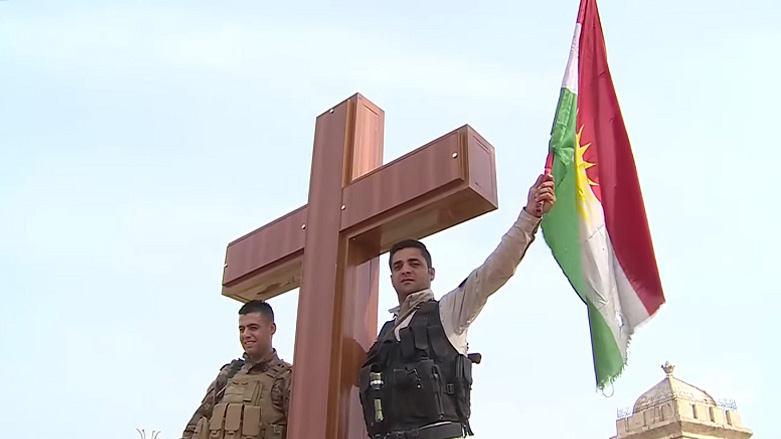US hails Kurdish role in protecting Christians, but fails to match words with deeds

WASHINGTON DC, United States (Kurdistan 24) – Promoting religious freedom and protecting persecuted Christians and other religious minorities is a vital element in the Trump administration’s national security agenda.
On Wednesday, Vice-President Mike Pence addressed the annual conference of the association In Defense of Christians (IDC), which focuses on the plight of threatened Christian communities in the Middle East.
“In Iraq, we see monasteries demolished, priests and monks beheaded, the two-millennia-old Christian tradition in Mosul clinging for survival,” Pence told the IDC.
“In Iraq, the followers of Christ have fallen by 80 percent in the past decade and a half,” the Vice-President warned. “Across the wider Middle East, we can now see a future in many areas without the Christian faith.”
The next day, State Department Spokesperson Heather Nauert praised the Kurds in strong terms for their role in protecting Christians and other minorities in Iraq.
“Without the Kurds, many of those families would eventually not be able to come home,” she said, responding to a question from Kurdistan 24.
“The Kurds were a huge part” of the fight against the Islamic State (IS), alongside Coalition and US forces, she said, helping “to protect those persecuted communities.”
“We will never forget what the Kurds have done,” she concluded.
But, where is the action from the US that would be commensurate with those words of gratitude?
Loay Mikhael heads the Foreign Relations Committee of The Chaldean Syriac Assyrian Popular Council, a political party representing Iraqi Christians.
On Friday, Mikhael explained to Kurdistan 24 that 90 percent of Iraq’s Christians now live in the Kurdistan Region.
There had been Christian communities in the south of Iraq, including in Baghdad and Basra, before 2003. But, conflict in the Arab areas of the country following the US-led war generated an ever-increasing persecution of Christians, and almost all of them have now relocated to the Kurdistan Region if they have not left Iraq altogether.
On Oct. 16, Iraqi forces, in combination with Iranian-backed Shia militias, known as the Popular Mobilization Forces (PMF), attacked Kirkuk, in an operation orchestrated by Qassim Soleimani, head of the Quds Force, the paramilitary arm of Iran’s Islamic Revolutionary Guard Corps (IRGC).
Further assaults from Iraqi forces and the PMF followed the initial attack.
“We saw tanks, we saw Humvees, coming in with Iranian flags, with Imam Ali and Hussein flags, and under them Iraqi flags,” Mikhael said.
“They burned houses, they killed people, they kidnapped people, and they tried to displace others.”
“Christians [had] fled again from the Nineveh Plain when the attack happened in Telskuf two days ago,” Mikhail explained. “They fled again to al Qush,” where Kurdish forces “have a presence.”
Notably, the displaced Christians did not seek refuge in the areas controlled by Iraqi forces and Shia militias, Mikhael said, but with the Kurds.
Three days before the assault on Kirkuk, President Donald Trump had announced, “I am authorizing the Treasury Department to further sanction the entire [IRGC] for its support for terrorism and to apply sanctions to its officials, agents, and affiliates.”
But, when the attack on Kirkuk occurred, in an operation orchestrated by a senior IRGC commander, in which IRGC proxies played a crucial role, the Trump administration turned a blind eye. It did nothing to halt the attack on the Kurds.
It is very difficult to understand how the Trump administration’s studied neutrality between a force that persecutes Christians and one that protects them is consistent with any serious commitment to protecting this endangered minority in that part of the world.
Editing by Karzan Sulaivany
